Randolph E. Bank
Philip E. Gill
Michael Holst
Administrative Contact:
[ Click to Send Email ]

| Ery Arias-Castro is a Professor of Mathematics at UCSD. He received his PhD in Statistics from Stanford University in 2004. After participating in semester long programs at the Institute for Pure and Applied Mathematics (IPAM) and at the Mathematical Sciences Research Institute (MSRI), he moved to UCSD in 2005. His research interests are in high-dimensional statistics, machine learning, spatial statistics, image processing, community detection, and applied probability. |
Scott Baden is a Professor of Computer Science and Engineering at UCSD. He received his Ph.D. in Computer Science from the University of California, Berkeley in 1987. Dr. Baden's research focuses on algorithms and run time support for irregular scientific computations. He is interested in large scale and data centric applications. Dr. Baden is a member of IEEE (Senior member) and SIAM, and a Senior Fellow at the San Diego Supercomputer Center. He is a founding member of UCSD's Computational Science, Mathematics, and Engineering Program (CSME) and the Bioinformatics program. |

|

| Randolph E. Bank is a Distinguished Professor of Mathematics at UCSD. He studies the numerical solution of partial differential equations by adaptive finite element methods. He is also interested in multilevel and domain decomposition iterative solvers for large linear systems. He received his PhD in Applied Mathematics in 1975 from Harvard University. He is a recent recipient of a Humboldt Research Award, has been named a SIAM Fellow, and is author of the finite element software package PLTMG. |
Yuri Bazilevs is a Professor of Structural Engineering at UCSD. He received his PhD in 2006 from ICES, UT Austin. He works on computational methods for fluid-structure interaction (FSI), biomechanics, and turbulent flow. He is one of the original developers of Isogeometric Analysis, and co-author with Cottrell and Hughes of the book "Isogeometric Analysis: Toward Integration of CAD and FEA". Yuri received the "Most Cited Author 2005-2008" award from J. Computer Methods in Applied Mechanics and Engineering, and the Young Investigator Award from the International Association for Computational Mechanics. |

|
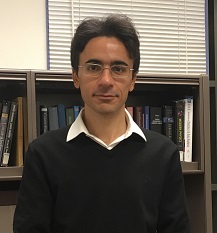
| Ali Behzadan is an Assistant Professor of Mathematics at California State University, Sacramento. Dr. Behzadan's research interests are primarily partial differential equations, numerical analysis, and functional analysis. In particular, he is interested in the theoretical and numerical study of differential equations on manifolds, properties of function spaces on manifolds, and their applications in mathematical physics. He holds a B.S. in Civil Engineering and an M.S. in Structural Engineering. He received his Ph.D. in Mathematics in 2015 and worked as Postdoc, Lecturer, and Project Scientist in the Department of Mathematics at UCSD before joining CSUS. |
Tom Bewley (BS/MS Caltech 1989, diploma VKI 1990, and, after a brief stint in the USAF, PhD Stanford 1998) is a Professor of Mechanical and Aerospace Engineering at UCSD. He works at the intersection of control theory, fluid mechanics, numerical methods, and applied math, and has a particular interest in the analysis, estimation, & forecasting of environmental flow systems with coordinated deployments of advanced robotic systems. He is the author of the forthcoming textbook Numerical Renaissance: simulation, optimization, & control, as well as its extensive accompanying codebase. |

|

| James R. Bunch is a Professor of Mathematics (Emeritus) at UCSD. He works primarily in numerical linear algebra, linear equations, least squares, eigensystems, singular values, and stability of algorithms in signal processing. His is one of the developers of LINPACK. He received his PhD in Applied Mathematics at UC Berkeley in 1969, and taught at the University of Chicago and Cornell University before coming to UCSD in 1974. |
Sam Buss is a Professor of Mathematics at UCSD. He works in the areas of logic, theoretical computer science, computer graphics, numerical methods. He research focuses on proof complexity and computational complexity, and he works on computer graphics, and numerical methods. He is the author of two books, one on Computer Graphics and one on Bounded Arithmetic. He received his Ph.D. from Princeton in 1985. In other activities, he has contributed algorithms for a number of commercially successful computer games. |

|
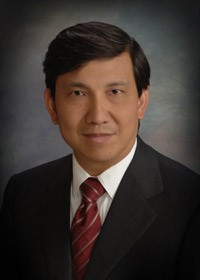
| Jiun-Shyan (JS) Chen is the William Prager Professor of Structural Engineering at UCSD. He received his PhD from Northwestern in 1989, and his research is in computational mechanics and multiscale materials modeling with specialization in Meshfree Methods, with applications to large deformation, fragment-impact, and biomechanics problems. He is one of the early developers of the Reproducing Kernel Particle Method (RKPM). He is the Past President of US Association for Computational Mechanics. He received the Computational Mechanics Award from the International Association for Computational Mechanics. |
Li-Tien Cheng is a Professor of Mathematics at UCSD. He works in the area of scientific computation with an emphasis on computational partial differential equations and interface dynamics via the level set method. He received his Ph.D. from the Department of Mathematics at UCLA in 2000 before moving to UCSD. He is a recipient of a Sloan Fellowship. |

|

| Albert Chern is an Assistant Professor of Computer Science and Engineering at UCSD. He studies the interplay among differential geometry, computational mathematics, and computer graphics. He received his Ph.D. in Applied and Computational Mathematics from Caltech. His work has resulted in novel applications in fluid dynamics, geometry processing, as well as classical numerical PDE challenges such as absorbing boundary conditions in wave computations. |
Alex Cloninger is an Assistant Professor of Mathematics at UCSD. He received his PhD in Applied Mathematics and Scientific Computation from the University of Maryland in 2014, and was then a Gibbs Assistant Professor of Mathematics at Yale University until 2017, when he joined UCSD. His research interests are in applied harmonic analysis, machine learning and neural networks, diffusion geometry, analysis of graphs and data sets sampled from continuous geometric structures embedded in high-dimensional spaces, and applications in various scientific domains. |

|

| Chris Deotte is a Mathematics Lecturer and Research Scientist at UCSD. He studied the numerical solution of partial differential equations by adaptive finite element methods. He received his Ph. D. in Mathematics with a specialization in Computational Science from UCSD in 2014. He is the author of the C library WEBGUI which provides a web browser based graphical user interface for any executable program. He is the author of the CCoM website and Play-Agricola website. His research interests are data science, machine learning, and deep learning. He is the world's second 4x quadruple Kaggle Grandmaster. |
Philip E. Gill is a Distinguished Professor of Mathematics at UCSD. He works in the area of numerical optimization, with an emphasis on large-scale linear and nonlinear programming, constrained and unconstrained optimization, and nonlinear least-squares. He received his PhD at the Imperial College of Science and Technology, University of London in 1974. He is a coauthor of the optimization packages LSSOL, NPSOL, QPOPT and SNOPT. He is a coauthor of three books on optimization. |

|

| Michael Holst is a Distinguished Professor of Mathematics and Physics at UCSD. He works in numerical analysis, applied analysis, partial differential equations, and mathematical physics. He received his Ph.D. from the University of Illinois, and was a von Karman Instructor and Prize Research Fellow in Applied Mathematics at Caltech prior to moving to UCSD in 1998. He is the recipient of an NSF CAREER Award and a Hellman Fellowship. He is the principle author of the finite element software package FETK, and is coauthor of a graduate textbook on applied analysis and partial differential equations with Ivar Stakgold. |
James Isenberg is an Adjunct Professor of Mathematics at UCSD and a Professor of Mathematics at the University of Oregon. He is one of the pioneers in the study of the constraint equations in classical general relativity. His contributions include the completion of the solution theory of the constraint equations on closed manifolds with constant mean curvature, and with his collaborators, the first nontrivial results on the non-constant mean curvature case. He was a graduate student under Charles Misner at the University of Maryland in the seventies. |

|

| H. Alicia Kim is a Jacobs Scholar Chair Professor in Structural Engineering at UCSD. She works in the area of topology optimization and multiscale and multiphysics design optimization with interests in structural and material design in engineering. She received her PhD in topology optimization from the University of Sydney, Australia and is a recipient of the UK Engineering and Physical Sciences Research Council Fellowship, Royal Academy of Engineering Fellowship and the Zonta International Amelia Earhart Fellowship. |
Boris Kramer is an Assistant Professor in Mechanical and Aerospace Engineering. He works on computational methods and numerical analysis for control, optimization, design and uncertainty quantification of complex and large-scale systems. He is particularly interested in reduced-order models and multifidelity approaches to solve those problems, and recent work has been on (reactive/thermal) flows. In the presence of uncertainties, he has worked on reliability-based design and design under uncertainty. He received his Ph.D. in Mathematics from Virginia Tech in 2015 and was a Postdoc in the Department of Aeronautics and Astronautics at MIT before joining UCSD. |

|
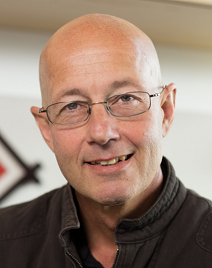
| Petr Krysl is a Professor of Structural Engineering at UCSD. He works on finite element methods for models of deformation of solids, especially for materials that present constraints in the form of near incompressibility and near inextensibility of reinforcing fibers. He also worked in the past on mesh generation, parallel processing, mesh-free methods, biomechanics, and nonlinear model reduction. He also collaborates in multi-disciplinary teams, especially in the area of bioacoustics, and in the area of underwater target detection. |
Melvin Leok is a Professor of Mathematics at UCSD. He works in the areas of computational geometric mechanics, computational geometric control theory, and numerical analysis. He received his Ph.D. in Control and Dynamical Systems from Caltech, and was a three-time NAS Frontiers of Science Fellow, and the recipient of the NSF CAREER Award, SciCADE New Talent Prize, Leslie Fox Prize in Numerical Analysis, and the SIAM Student Paper Prize. Additionally, he is on the editorial boards of the Journal of Nonlinear Science, the Journal of Geometric Mechanics, and the Journal of Computational Dynamics, and previously served on the editorial boards of the SIAM Journal on Control and Optimization, and the LMS Journal of Computation and Mathematics. |

|

| Lee Lindblom is a Research Scientist in the Center for Astrophysics and Space Science at UCSD. His interests include problems in mathematical astrophysics (e.g. structure and stability of relativistic stellar models, determining the neutron star equation of state from astrophysical observations), relativistic hydrodynamics (e.g. causal theories of viscous and heat conducting fluids), mathematical problems that arise in gravitational wave data analysis (e.g. accuracy standards for model waveforms), and computational problems in geometrical PDEs (e.g. Einstein's equation and Ricci flow) on manifolds with non-trivial topological structures. |
Shaoying (Kathy) Lu is a Project Scientist of Bioengineering and Lecturer of Mathematics at UCSD. She works in the areas of image-based mathematical and systems biology, with applications in molecular diffusion and live-cell imaging. She received her Ph. D. in mathematics from UCSD in 2004, and worked at University of Illinois Urbana-Champaign as a research assistant professor prior to moving to UCSD in 2013. She is a recipient of DMS/NIHGMS initiative award at the interface of mathematics and biology. |
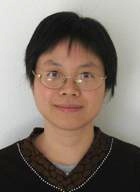
|

| Olvi Mangasarian is the John von Neumann Professor Emeritus of Mathematics and Computer Sciences at the University of Wisconsin, Madison. He is also a Research Scientist in the Department of Mathematics at UCSD. Mangasarian is the author of the 1994 SIAM book, "Nonlinear Programming" and co-author of the 2007 SIAM book "Linear Programming". His current research is in the areas of privacy-preserving classification and optimization, knowledge-based machine learning and approximation, support vector machines and absolute value equations. |
David Meyer is a Professor of Mathematics at UCSD. He works in discrete models for classical and quantum physical systems, codes and algorithms for quantum computing, and topological analysis of large datasets. He received his B.A. and M.A. in Mathematics from Johns Hopkins and his Ph.D. in Mathematics from MIT. He held visiting and postdoctoral positions in Mathematics and Physics at Syracuse, in Physics at Duke, and in Physics at UCSD before joining the UCSD Mathematics Department. He currently holds the George W. and Carol A. Lattimer Campus Professorship at UCSD. |

|

| Jiawang Nie is a Professor of Mathematics at UCSD. Before joining UCSD, Dr. Nie was a Postdoctoral Fellow at the Institute of Mathematics and its Applications (IMA). His research is in the field of computational optimization, with an emphasis on semidefinite programming and multivariate polynomial optimization. He has published over twenty research papers, and is the recipient of an NSF CAREER Award. |
Padmini Rangamani Padmini Rangamani is an assistant professor in the Department of Mechanical and Aerospace Engineering at UCSD. Her interests lie in the spatial and mechanical modeling of biological processes at the single cell level. Currently, her group is focused on using reconstructed three-dimensional geometries from microscopy images to model cell signaling. She obtained her B.S. in Chemical Engineering from Osmania University in India and M.S. in Chemical Engineering at Georgia Institute of Technology. She holds a Ph.D. in Biological Sciences from the Icahn School of Medicine at Mount Sinai and did her postdoctoral work at UC Berkeley. She has received many early career awards including a Sloan Fellowship, and young investigator awards from the Army, Navy, and the Air Force. |
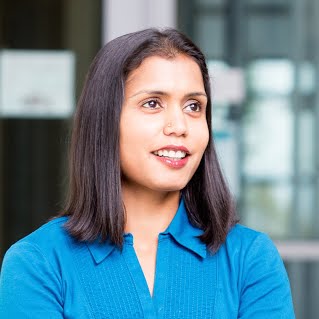
|

| Jeff Remmel is a Professor of Mathematics and Associate Dean, Physical Sciences at UCSD. His research is focused on three main areas: (1) Algebraic and Enumerative combinatorics, (2) Logic, and (3) Theorectical Computer Science. Recent work in includes the application of the theory of symmetric and quasisymmetric functions to compute generating functions in area (1), the study of the effective content of theorems in mathematics in area (2), and the study of extensions of Answer Set Programming and efficient ways to compute stable models in such extensions in area (3). |
Rayan Saab is an Assistant Professor of Mathematics at UCSD. He received his PhD from the University of British Columbia in 2010 and was then a Visiting Assistant Professor of Mathematics at Duke University until 2013, when he joined UCSD. His work is in applied and computational harmonic analysis, and mathematical signal processing (broadly defined). His research interests include sparse approximation, compressed sensing, and quantization. |

|

| Ivar Stakgold is a Professor Emeritus in the Department of Mathematical Sciences at the University of Delaware. He is also a Research Scientist in the Department of Mathematics at UCSD. His research interests are in nonlinear partial differential equations, reaction-diffusion equations, and bifurcation theory. He is the author of several books, including three editions of Green's Functions and Boundary Value Problems, a classic graduate textbook on applied analysis and partial differential equations that is used by a number of applied mathematics doctoral programs around the country. |
Daniel Tartakovsky is a Professor of Mechanical and Aerospace Engineering at UCSD. He works in the areas of uncertainty quantification, stochastic partial-differential equations, and mathematical modeling of complex systems. He received his Ph.D. from the University of Arizona in 1996, and worked at Los Alamos National Laboratory prior to moving to UCSD in 2004. |

|

| Manuel Tiglio is a Research Scientist in the Center for Astrophysics and Space Sciences (CASS) at UCSD. His research interests are in real-time solutions to complex problems, both forward (simulations) and inverse (parameter estimation, model selection, Bayesian inference) ones; uncertainty quantification, high order and spectral methods in complex geometries, heterogeneous computing and, more broadly: gravitational wave physics, computational mathematics, scientific computing and numerical analysis, in particular reduced order modeling, learning, and data mining. |
 News]
News]